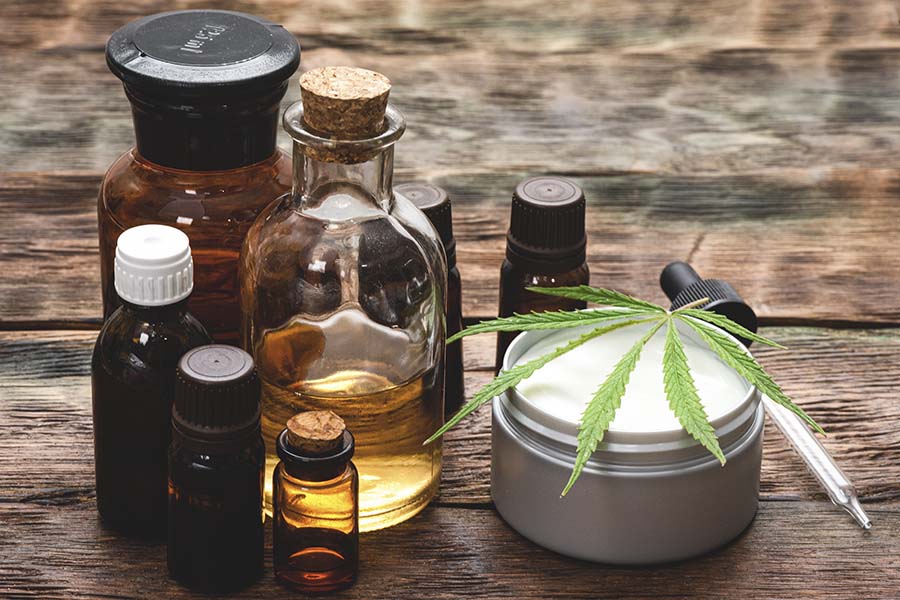Confusion Lingers about the Legality and Health Implications of Cannabis-based Products
Friday, March 13, 2020
By Nurhan Turgut Dunford, FAPC Oil/Oilseed Specialist
Many of you have probably heard the following terms: hemp, industrial hemp, cannabis, CBD and THC, but are not quite sure what exactly they are and whether they are good or bad for you. If that is the case, you are not alone.
I believe the confusion stems from the fact that cannabis refers to a number of plant species. Cannabis sativa L. is the genus name for plants, which are broadly classified into two groups: industrial hemp and marijuana. Cannabis plants produce hundreds of chemicals including cannabinoids, terpenes and phenolic compounds. These plant components possess interesting pharmacological and biological properties including health benefits and psychoactivity.
Hemp, also referred to as industrial hemp, is the cannabis sativa plant species grown specifically for industrial uses (not as a drug) for its stalks, which are a source of strong fiber. Industrial hemp seeds are rich in oil (more than 30 g per 100 seed) and contain other nutrients such as vitamins, minerals, proteins and fiber. Hemp seed oil is similar in chemical composition to other vegetable oils and mainly contains unsaturated fatty acids, particularly essential fatty acids our bodies cannot produce and need to be provided through diet. Hemp seed oil is considered healthy because of its high content of omega-3 fatty acids, which are reported to be beneficial for reducing some chronic conditions, such as cancer and inflammation.
Traditionally, hemp is an agricultural commodity and produced in the field, while marijuana is mostly grown in greenhouses or other controlled environment facilities. Industrial hemp contains low (less than 0.3% on a dry weight basis) concentrations of the psychoactive compound delta-9-tetrahydrocannabinol (THC). Marijuana contains the same compound at much higher concentrations, 3-15%. Cannabidiol (CBD) is another compound that is biosynthesized in Cannabis sativa plants. CBD is frequently characterized as “non-psychoactive” or “non-psychotropic” in comparison to THC. However, some argue otherwise and suggest “more accurately, CBD should be labeled as ‘non-intoxicating,’ and lacking associated craving and compulsive use.” CBD oil is extracted from the flowers and leaves of the cannabis plant, not hemp seeds. The chemical composition of the CBD oil is different than the hemp seed oil. CBD oil is marketed under different names, such as CBD-rich hemp oil, hemp-derived CBD oil or CBD-rich cannabis oil. Some of you may have heard CBD decreases anxiety, improves sleep and provides other neuroprotective effects. If you are interested in these products, I would caution that most of the products claiming to possess health benefits and currently marketed as such, do not go through a rigorous chemical and clinical testing for quality and efficacy.
Since the signing of the Agriculture Improvement Act into law in December 2018 (Farm Bill), there has been a great deal of confusion about the production and marketing of cannabis-derived products. The law redefined industrial hemp as a different substance from marijuana and removed hemp from the Controlled Substances list. Hence, industrial hemp is no longer an illegal substance under federal law. The markets quickly capitalized on this new regulation. Now, many foods and dietary supplements are being formulated with industrial hemp and cannabis-derived ingredients. Unfortunately, a lot of consumers and even producers are not well informed of the legal status and health implications of these products.
Federal Food, Drug and Cosmetic Act (FD&C Act) and section 351 of the Public Health Service Act gives the authority to the Food and Drug Administration (FDA) to regulate products containing cannabis or cannabis-derived compounds. A product marketed with a therapeutic benefit, diagnosis, cure, mitigation, treatment or prevention of diseases (such as cancer, Alzheimer’s disease, psychiatric disorders and diabetes) claim needs to be approved by the FDA before it may be introduced into commerce. This is the same regulation that applies to any product marketed as a drug for human or animal use.
There are a variety of CBD products, such as oil drops, capsules, syrups, food products (chocolate bars and teas), and topical lotions and creams in the market. FDA considers introduction of foods and dietary supplements containing added CBD or THC extracted from plants into interstate commerce, regardless of whether the substances are hemp-derived, is unlawful. This is because both CBD and THC are active ingredients in FDA-approved drugs. They must go through substantial clinical investigations before they can be marketed as foods or dietary supplements. The goal of this regulation is to ensure products have been proven to be safe or effective and protect the consumers. Indeed, the FDA has sent warning letters to companies illegally selling CBD products and claiming to prevent, diagnose, treat or cure serious diseases.
It also is important to understand some of these products are marketed without FDA approval and may contain high concentrations of harmful pesticides and other agricultural toxins.
The FDA has the authority to issue a regulation allowing the use of a pharmaceutical ingredient in a food or dietary supplement. In a recent FDA consumer update, released on November 25, 2019, companies are encouraged to seek FDA approval to market CBD-containing products with therapeutic claims. Currently, there is only one FDA-approved CBD product: Epidiolex, a prescription drug to treat two rare, severe forms of epilepsy.
If you are interested in the production, marketing and health effects of these products, I would strongly encourage you to visit the FDA website for detailed instructions.

